|
De Amerikaanse schrijver William Gibson werd geboren op 13 november 1914 in New York.
Gibson bezocht het City College of New York. In 1948 schreef hij zijn eerste boek, Dinny and the Witches, maar pas met de in 1954 met de roman The Cobweb boekte hij succes. In 1958 werd zijn eerste toneelstuk Two for the Seesaw uitgevoerd op Broadway. Er werden 750 voorstellingen van gegeven en het werd genomineerd voor een Tony Award. Robert Wise verfilmde het in 1962 met Robert Mitchum en Shirley MacLaine. 1959 volgde The Miracle Worker, zijn meest succesvolle werk. Het stuk, gebaseerd op het verhaal van Helen Keller, won in 1960 de Tony Award en werd 1959-1961 719 opgevoerd. Arthur Penn's filmversie ervan met Anne Bancroft in de hoofdrol werd in 1962 bekroond met twee Oscars, Gibson was ook genomineerd voor zijn scenario. In 1964 werd hij nogmaals genomineerd voor een Tony voor de musical Golden Boy die hij in samenwerking met Clifford Odets had geschreven. Tot 2005 werden zes verdere stukken van Gibson uitgevoerd op Broadway, waaronder Cry of Players over het leven van de jonge William Shakespeare en Golda's Balcony over Golda Meir.
xml:namespace prefix = o ns = "urn:schemas-microsoft-com:office:office" />
Uit: The Miracle Worker
ACT ONE
[It is night, and we are in a child's crib, looking up: what we see are the crib railings and three faces in
lamplight, looking down. They have been through a long vigil, it shows in their tired eyes and disarranged
clothing. One is a gentlewoman in her twenties with a kindly and forbearing face, KATE KELLER; the
second is a dry elderly DOCTOR, stethoscope at neck, thermometer in fingers; the third is a dignified
gentleman in his forties with chin whiskers, CAPTAIN ARTHUR KELLER. Their dress is that of 1880, and
their voices are southern. The KELLERS' faces are drawn and worried, until the DOCTOR speaks.]
DOCTOR
She'll live.
[KATE closes her eyes.]
You're lucky,Captain Keller. Tell you now, I thought she wouldn't.
KELLER [heavily]
Doctor.Don't spare us.Will she be all right?
DOCTOR
Has the constitution of a goat.Outlive us all. Especially if I don't get some sleep.
[He removes his stethoscope, his face leaves the railing; we continue to hear him, but see
KELLER'S hand across the crib take and squeeze KATE'S.]
You run an editorial in that paper of yours,Captain Keller, wonders ofmodernmedicine,wemay not know what
we're curing but we cure it.Well, call it acute congestion of the stomach and brain.
[KELLER moves after the DOCTOR, we hear them off-camera; we see only KATE'S tearfully happy
face hovering over us, her hand adjusting the blanket]
KELLER
I'll see you to your buggy. I won't undertake to thank you,Doctor-
DOCTOR [simultaneously]
Main thing is the fever's gone. I've never seen a baby,more vitality, that's the truth. Bymorning
she'll be knocking down your fences again.
KELLER
Anything that you recommend us to do,we'll do
DOCTOR
Might put up stronger fencing. Just let her getwell, she knows howto do it better than we do. Don't poke at Providence, rule I've alwaysmade it a practice to-
[But throughout, their voices have been dying out of focus, and the image of KATE's face has begun
to swim. Music steals in; we hear the music without distortion, but light and sound otherwise are
failing. KATE's serene face smiles down with love, blurring in a halo of light, then is a spot, then is
gone. Darkness.]
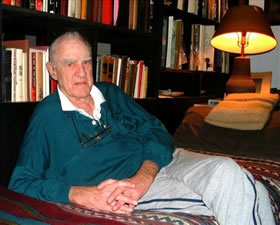
William Gibson (13 november 1914 - 25 november 2008)
De Frans-Canadese dichter en politicus Gérald Godin werd geboren op 13 november 1938 in Trois-Rivières, Quebec. Zie ook mijn blog van 13 november 2008 en ook mijn blog van 13 november 2009.
T'en souviens-tu, Godin?
T'en souviens-tu, Godin
astheure que t'es député
t'en souviens-tu
de l'homme qui frissonne
qui attend l'autobus du petit matin
après son chiffre de nuit
t'en souviens-tu des mal pris
qui sont sul'bien-être
de celui qui couche dans la neige
des trop vieux pour travailler
qui sont trop jeunes pour la pension
des mille métiers mille misères
l'amiantosé le cotonisé
le byssinosé le silicosé
celui qui tousse sa journée
celui qui crache sa vie
celui qui s'arrache les poumonsv celui qui râle dans sa cuisine
celui qui se plogue sur sa bonbonne d'oxygène
il n'attend rien d'autre
que l'bon dieu vienne le chercher
t'en souviens-tu
des pousseurs de moppes
des ramasseurs d'urine
dans les hôpitaux
ceux qui ont deux jobbes
une pour la nuitte
une pour le jour
pour arriver à se bûcher
une paie comme du monde
t'en souviens-tu, Godin
qu'il faut rêver aujourd'hui
pour savoir ce qu'on fera demain?
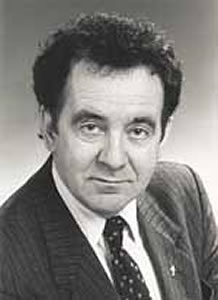
Gérald Godin (13 november 1938 12 okrober 1994)
De Duitse schrijver en kunstenaar Karl Jakob Hirsch werd op 13. November 1892 in Hannover geboren als zoon van een Joodse arts. Hij bezocht daar ook de middelbare school. Van 1909 tot 1912 studeerde hij aan de kunstacademie in München schilderkunst. Hij woonde in de kunstenaarskolonie Worpswede en in Parijs, daarna in Berlijn. Van 1916 tot 1918 nam hij deel aan de Eerste Wereldoorlog, na de Novemberrevolutie van 1918 was hij lid van de Raad van intellectuele werknemers" en daarna volgde de artistieke gemeenschap Novembergruppe, die revolutionaire en socialistische doelen nastreefde. Tot halverwege de jaren twintig maakte Hirsch naast een groot aantal grafische werken inmiddels verdwenen schilderijen die hem toonden als vertegenwoordiger van de expressionistische beweging. In de tweede helft van de jaren twintig verwisselde Hirsch de beeldende kunst voor de literatuur. Met zijn eerste roman, "Kaiserwetter", die briljant de sfeer van het late keizerrijk in een provinciestad portretteert, behaalde hij een groot succes, maar het reeds geschreven vervolg kon na de machtsovername van de nationaal-socialisten niet meer verschijnen. Hirsch emigreerde in december 1934. Hij ging eerst naar Denemarken en vervolgens naar Zwitserland en 1936 in de Verenigde Staten. Nadat hij een tijd voor de Amerikaanse militaire regering in München actief was geweest ging Hirsch in 1948 definitief terug naar Duitsland.
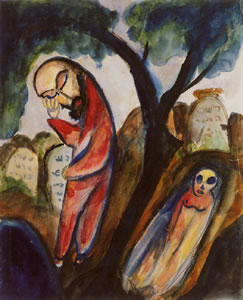
Karl Jacob Hirsch, der trauernde Martin Buber in einem jüdischen Friedhof, Waterverf, 1920
Uit: Kaiserwetter
Joe und Bernhard hätten sich wohl niemals kennengelernt, wenn nicht eines Tages zwischen
den Schülern der Oberrealschule und den Gymnasiasten eine Balgerei entstanden wäre,
eine von den schon traditionell gewordenen Auseinandersetzungen in der Goethestraße
zwischen den Schülern jener beiden Lehranstalten, die nahe beieinander und doch durch eine abgrundtiefe Bildungskluft getrennt lagen."
(...)
Es war ein heiterer Morgen, der aber traurig enden sollte. Als Fritz Jünger in die Georgstraße einbog, um wiegend und bedächtig in die Schule zu wandern, da fuhr aus einer kleinen Seitenstraße ein Radfahrer mit einer solchen Geschwindigkeit in die Georgstraße, dass der ahnungslose Knabenlehrer zu Boden geworfen wurde.
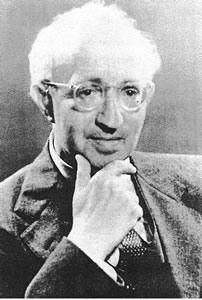
Karl Jakob Hirsch (13. November 1892 - 8. Juli 1952)
De Schotse schrijver Robert Louis Stevenson werd geboren in het Schotse Edinburgh op 13 november 1850. Zie ook mijn blog van 13 november 2006 en ook mijn blog van 13 november 2008 en ook mijn blog van 13 november 2009.
Uit: Treasure Island
He was a very silent man by custom. All day he hung round the cove, or upon the cliffs, with a brass telescope; all evening he sat in a corner of the parlour next the fire, and drank rum and water very strong. Mostly he would not speak when spoken to; only look up sudden and fierce, and blow through his nose like a fog-horn; and we and the people who came about our house soon learned to let him be. Every day, when he came back from his stroll, he would ask if any seafaring men had gone by along the road? At first we thought it was the want of company of his own kind that made him ask this question; but at last we began to see he was desirous to avoid them. When a seaman put up at the "Admiral Benbow" (as now and then some did, making by the coast road for Bristol), he would look in at him through the curtained door before he entered the parlour; and he was always sure to be as silent as a mouse when any such was present. For me, at least, there was no secret about the matter; for I was, in a way, a sharer in his alarms. He had taken me aside one day, and promised me a silver fourpenny on the first of every month if I would only keep my "weather-eye open for a seafaring man with one leg," and let him know the moment he appeared. Often enough, when the first of the month came round, and I applied to him for my wage, he would only blow through his nose at me, and stare me down; but before the week was out he was sure to think better of it, bring me my fourpenny piece, and repeat his orders to look out for "the seafaring man with one leg."
How that personage haunted my dreams, I need scarcely tell you. On stormy nights, when the wind shook the four corners of the house, and the surf roared along the cove and up the cliffs, I would see him in a thousand forms, and with a thousand diabolical expressions. Now the leg would be cut off at the knee, now at the hip; now he was a monstrous kind of a creature who had never had but the one leg, and that in the middle of his body. To see him leap and run and pursue me over hedge and ditch was the worst of nightmares. And altogether I paid pretty dear for my monthly fourpenny piece, in the shape of these abominable fancies.
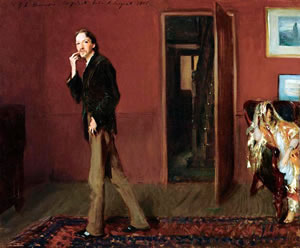
Robert Louis Stevenson (13 november 1850 3 december 1894)
Robert Louis Stevenson and His Wife (1885) door John Singer Sargent
De Zweedse dichter Esaias Tegnér werd geboren op 13 november 1782 in Kyrkerud. Zie ook mijn blog van 13 november 2008.
Uit: Fridthjofs Saga
Fridthjof and Ingeborg. (Fragment)
In Hilding's garden, green and fair,
Protected by his fostering care,
Two rare and stately plants were growing,
Unequaled grace and beauty showing.
The one a sturdy oak tree grew,
With lance-like stem so straight and true,
Its crown in northern tempests shaking
Like helmet plume in battle quaking.
The other like a rose sprang forth
When tardy winter leaves the north,
And spring, which in the buds lies dreaming,
Still waits with gems to set them gleaming.
Around the earth the storm-king raves,
The wrestling oak its anger braves;
The sun dissolves frost's mantle hoary,
The buds reveal their hidden glory.
So they grew up in joy and glee,
And Fridthjof was the young oak tree;
Unfolding in the vale serenely,
The rose was Ingeborg the queenly.
Saw you those two by light of day
You seem in Freyja's house to stay,
Where bride-pairs, golden-haired, were swinging,
Their way on rosy pinions winging.
But seeing them by moonlight pale
Round dancing in the leafy vale,
You'd think: The elf-king now advances,
And leads his queen in fairy dances.
Vertaald door Thomas en Martha Holcomb
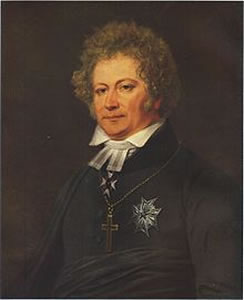
Esaias Tegnér (13 november 1782 2 november 1846)
Portret door Johan Gustaf Sandberg, rond 1826.
|



